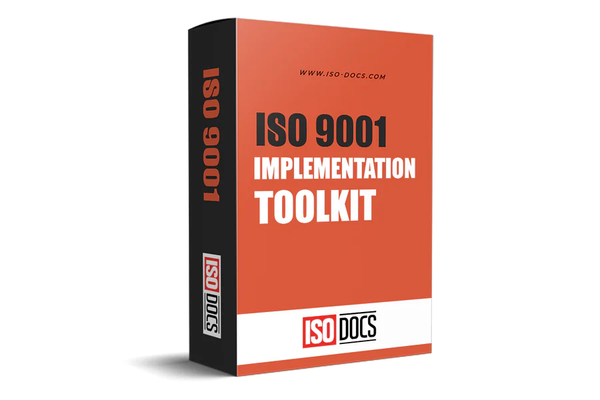ISO 9001 - Clause 7.1.6 Organizational Knowledge
What Is Organizational Knowledge ?
Organisational knowledge is the shared understanding of an organisation's goals, objectives, values, culture, and operating procedures. It includes the knowledge of how the organisation functions, how it makes decisions, and how it gets work done.

Organisational knowledge is created and maintained through the interactions of people within the organisation. It is constantly evolving and growing as new information is added and old information is modified or forgotten.
The quality management system (QMS) 9001:2016 standard requires that organisations have a documented procedure for managing organisation knowledge. This procedure should identify the types of knowledge that need to be managed and the methods for doing so.
The goal of this procedure is to ensure that the organisations knowledge is accurate, up-to-date, and accessible to those who need it. Organisational knowledge management (OKM) is the process of creating, storing, and using organisation knowledge.
It includes the creation of new knowledge, the curation and storage of existing knowledge, and the use of knowledge to support decision-making.
OKM is a continuous cycle of activities that begins with the identification of what needs to be known and ends with the deployment of that knowledge to achieve organisational goals.
In between, OKM involves the collection, analysis, and synthesis of data; the development and testing of hypotheses; the generation of new insights; and the sharing of those insights with others in the organisation.
The goal of OKM is to improve organisational performance by making better use of the collective intelligence of its people. To do this, organisations must create an environment that supports knowledge sharing and collaboration.
Why Organisational Knowledge Is Important ?
Organisational knowledge is the collective understanding, wisdom, and experience of an organisation. It includes the understanding of the organisation's purpose, values, goals, strategies, and processes. Organisational knowledge is important because it helps organisations to make better decisions, improve performance, and adapt to change.
Organisations today are constantly bombarded with data and information. To make sense of all this data, they need to have a strong foundation of knowledge. This knowledge helps them to identify trends, make predictions, and act.
Organisational knowledge is also important for innovation. Organisations need to be able to understand their environment and identify opportunities for change. They also need to be able to experiment and learn from their mistakes.
With a strong foundation of knowledge, organisations can be more agile and adapt to change more quickly. There are many ways to build organisational knowledge. One way is to create a knowledge management system. This is a system that captures, organises, and stores knowledge so that it can be easily accessed and reused.
Another way to build organizational knowledge is to encourage employees to share their knowledge. This can be done through mentoring, training, and social networking.
How can you capture the organizational knowledge of your company?

1. Work instructions - Work instructions in the organisational knowledge qms 9001 are a type of document that specifies the steps that need to be taken to complete a task. They are an important part of quality management systems (QMS) and are often used in conjunction with ISO 9001.
Work instructions can be used to communicate procedures, processes, or methods to employees, customers, or suppliers. They can be used to document internal or external tasks. Work instructions should be clear, concise, and easy to follow.
The purpose of work instructions is to ensure that tasks are completed correctly and consistently every time they are performed. By clearly documenting the steps that need to be taken to complete a task, you can minimize errors and rework.
2. Checklist - A checklist is a process of continual improvement that uses feedback to promote and ensure the quality in products or services. This feedback can be from customers, suppliers, employees, or other sources. It is important to have a system in place to collect, track, and respond to this feedback.
3. Training packages - Training packages can provide a way to document and improve organisational knowledge. They can also be used to improve communication and coordination among employees.
4. On-the-job training - The process of On-the-job training in organisational knowledge begins with the identification of specific training needs within the organisation. Once these needs are identified, a training program is developed to address these needs.
5. Knowledge database - The organisational knowledge database is a collection of information that is used to support decision-making in an organisation. It includes knowledge about the organisation's products, services, processes, and functions.
The database is used to store and retrieve knowledge so that it can be shared among employees.
An organisation's knowledge database is important because it helps to improve decision-making, communication, and collaboration. It also helps to reduce the cost of training and development.
The Benefits of Implementing Organisational Knowledge Management Processes?
Organisational Knowledge Management (OKM) is a process of acquiring, storing, and distributing organisational knowledge, so that it can be used to improve organisational performance.
There are many benefits of implementing OKM processes, including:
- Improved decision-making: By having all relevant knowledge easily accessible, decision-makers can make better-informed decisions.
- Enhanced creativity and innovation: By encouraging employees to share knowledge, OKM can help to stimulate new ideas and solutions.
- Increased efficiency and productivity: By streamlining knowledge sharing, OKM can help employees to work more efficiently and effectively.
- Reduced costs: By making knowledge readily available, OKM can help to reduce training and development costs.
- Improved organisational performance: By improving decision-making, creativity, and efficiency, OKM can help to improve overall organisational performance.



